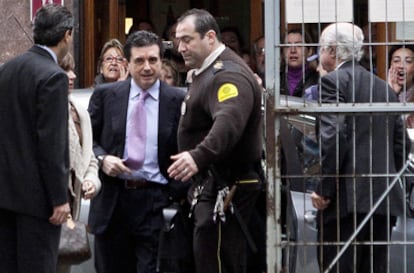Top architect in eye of Balearic storm
Ex-regional premier defends the contracting of Santiago Calatrava for opera house
Santiago Calatrava, the celebrated Valencian architect among whose best-known works are the TGV station in Lyon, the Ciutat de les Arts i les Ciències in his home city and the redesign of Athens' Olympic Stadium, gave testimony last week in a case in which he stands accused of accepting an illegal 1.2-million-euro contract from the Popular Party (PP)-run Balearics regional government in 2007 to build an opera house in the bay of Palma de Mallorca. Calatrava told Judge José Castro that the former premier of the island region, Jaume Matas, entrusted the work to him in September 2006, eight months before the contract was officially confirmed and without a public tender.
"I did not meet Matas," Calatrava told the court. The architect later produced documents, models and plans to demonstrate the legality of his contract with the Balearics administration. Calatrava said he first met Matas in Rome, where he was presented to the former PP environment minister from the José María Aznar government, by Pedro Serra, the curator of the Es Baluard museum where Calatrava had mounted a sculpture.
"Absolutely everything about the contract is nothing more than a farce"
Matas, who has been freed on bail of 3 million euros and faces charges of alleged corruption over the Palma Arena scandal, gave his account yesterday in the same court. Matas, who was forced to give up his Popular Party membership before posting bail, is indicted on 13 counts over the construction of the Palma Arena sports center, including misappropriation of public funds and tax fraud, which could add up to a 24-year jail term.
The arena's budget ballooned from 41 million euros to 110 million euros and initiated an investigation into Matas' personal fortune and alleged illegal financing of the regional PP.
As was anticipated, Matas defended the viability of the project and stated that the contract he awarded Calatrava remains valid as the current Socialist-led administration in Palma has not lodged a complaint. Matas testified the process of awarding the contract was in order and his government's offer to Calatrava was born of a desire to have one of his works adorn the Balearic Islands. Matas told reporters that his lawyer had asked the case be shelved due to lack of evidence.
The public prosecutor's office has demanded Matas pay a 1.6-million-euro civil bond against the 1.2-million-euro payment to Calatrava for a pre-project presentation that never went ahead. The cost to the public of the canceled showcase was 120,000 euros. The former environment minister stands accused of misappropriation of public funds, corruption and fraud over the affair.
"Absolutely everything about the contracting [of Calatrava] is nothing more than a farce," the prosecution said in its report. Matas' staging of the presentation was "exclusively for his personal benefit and that of his party," the report continued, adding that seeking Calatrava's services was "for his own interests as [electoral] candidate."
The anti-corruption prosecutor ultimately decided not to demand a civil bond for Calatrava of the same amount as that imposed on Matas. Prosecutor Pedro Horrach did call for preventive measures against the former education chief in the region, Francisco Fiol.
If the judge ratifies the request, Fiol's political career could be severed immediately as the Balearic PP prevents candidates under legal investigation from running. Fiol, leader of the PP in Palma, had been aspiring to the mayoralty.

Tu suscripción se está usando en otro dispositivo
¿Quieres añadir otro usuario a tu suscripción?
Si continúas leyendo en este dispositivo, no se podrá leer en el otro.
FlechaTu suscripción se está usando en otro dispositivo y solo puedes acceder a EL PAÍS desde un dispositivo a la vez.
Si quieres compartir tu cuenta, cambia tu suscripción a la modalidad Premium, así podrás añadir otro usuario. Cada uno accederá con su propia cuenta de email, lo que os permitirá personalizar vuestra experiencia en EL PAÍS.
¿Tienes una suscripción de empresa? Accede aquí para contratar más cuentas.
En el caso de no saber quién está usando tu cuenta, te recomendamos cambiar tu contraseña aquí.
Si decides continuar compartiendo tu cuenta, este mensaje se mostrará en tu dispositivo y en el de la otra persona que está usando tu cuenta de forma indefinida, afectando a tu experiencia de lectura. Puedes consultar aquí los términos y condiciones de la suscripción digital.








































